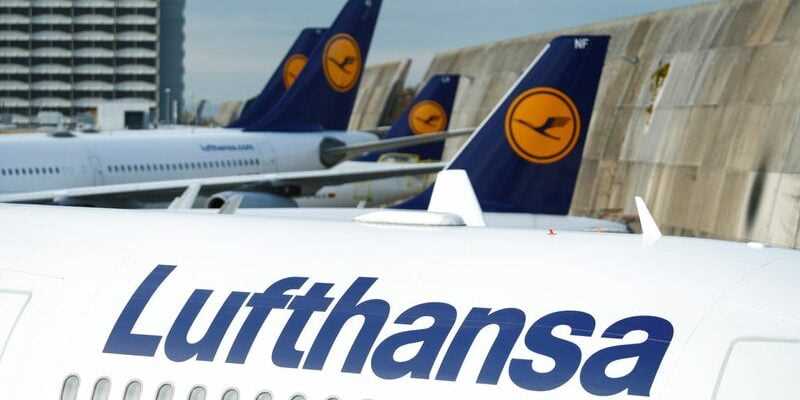Pascal Simon-Doutreluingne, University of Strasbourg
In return for this “acquired right”, European Union law obliges airlines to use at least 80% of the time slots allocated, considering that below this threshold, they did not need it. If so, other airlines may have it.
“Bluff”
This threshold has been suspended many times, when each circumstance required it, taking into account, for example, the disturbances caused by the eruption of a volcano until the Covid-19 crisis. Since the resumption of air traffic in the summer of 2021, the minimum usage threshold has been raised to 50%. It is this recovery that Lufthansa disputes by announcing, last December, that it will have to organize approximately 18,000 empty flights. The German airline has thus revived a controversy which reveals the balance of power between the various stakeholders as so many fault lines in an economic sector in full doubt as to its future.
Planes flying empty to keep airport slots: back on the controversy https://t.co/1LgZc9qxhN pic.twitter.com/QMtfVxg7Al
— The Conversation France (@FR_Conversation) March 22, 2020
Moreover, ACI Europe, the professional association of airport managers, estimated in a press release that there was “absolutely no reason” to fly the planes empty and the press described Lufthansa’s announcement as ” blow of bluff”, stressing that the European regulations do not oblige these flights.
Indeed, the European texts indicate that the rules concerning slots do not apply in the event of a “partial or total closure of the border”, a “reduction in the capacity of the airport, for a substantial part of the relevant timetable period” or even “travel restrictions [comme] bans on flights from or to certain countries or geographical areas”. No rule therefore imposes on any company to operate such flights.
European regulations only prevent the German company from massively canceling insufficiently full flights to be profitable ⬇⬇https://t.co/VNm5KHhTYg
— EchosEntreprises (@EchosEntreprise) January 11, 2022
However, behind this controversy is a battle to influence regulatory developments. Since 2015, the European institutions have indeed been debating in order to establish a strategy for civil aviation, taking into account the necessary ecological transition, the competitive upheavals due to low-cost companies, and finally the international competition embodied by the companies of the Persian Gulf.
The current pandemic has intensified this debate, giving this controversy over these Lufthansa airline flights a special interest. It testifies that, in this depressed health and economic context, airlines are trying to impose their views on airports and European institutions in two conflicting cases.
Balance of power
The first relates to a double reform in progress, including the overhaul of the allocation of airport slots as well as better consumer protection, the current text of which dates from 2004. The European Commission’s proposals, formulated 10 years ago , remain blocked in the ordinary legislative process, involving the European Parliament and the Council of Ministers with equal weight. These two institutions do not find a political agreement, despite the inclusion of these two reforms as a priority for action in 2021.
The two legislators oppose the project to increase the threshold for the use of airport slots to 85%, and wish to temporize on the strengthening of passenger rights, while airlines have not finished compensating their passengers for cancellations made in the spring of 2020. Lufthansa’s decision seems to want to reactivate the will on both sides to move forward on this legislative dossier.
The second file opposes, in a context of slow and uncertain recovery of air traffic, the airlines and the airports on the calculation of the airport charges due by the first to the second. Airport charges are currently paid by airlines for the use of airport facilities and services. They are part of the total price paid by passengers and air cargo customers. Airport charges therefore represent an important part of airport revenues and a non-negligible part of airline operating costs.
This was the meaning of one of the support measures for the sector following the pandemic, which led to the postponement, announced on March 29, 2020, of the payment of certain taxes and fees due between March and December 2020, over the years 2021 and 2022. The measure concerns the civil aviation tax and related taxes such as the fees for terminal air traffic services collected by Eurocontrol or the solidarity tax on plane tickets.
This State aid measure, declared compatible with EU law, in addition to the reactions of the airlines, sometimes to say that the aid is insufficient, sometimes to challenge its merits, basically boils down to a double criticism. This concerns on the one hand the fact that access to the territory is taxed, thus playing against its competitiveness in world competition, and on the other hand, on an “overtaxation” of the national airlines whose market is mainly to and from the territory concerned.
Consequently, they are the object of a real balance of power between private operators, against a background of resource shortage and systemic crisis in the sector. This is what the controversy around empty legs reminds us at the start of the year.
Frédérique Berrod, professor at Sciences Po Strasbourg, supervised the writing of this article.
Pascal Simon-Doutreluingne, Associate Professor of Economics-Management, Doctoral Student in Public Law (Competition Law), University of Strasbourg
This article is republished from The Conversation under a Creative Commons license. Read the original article.
